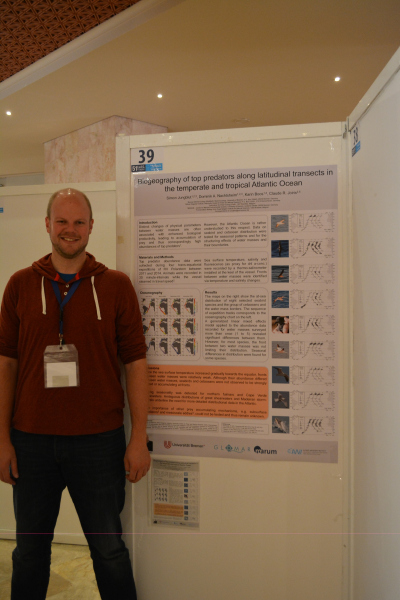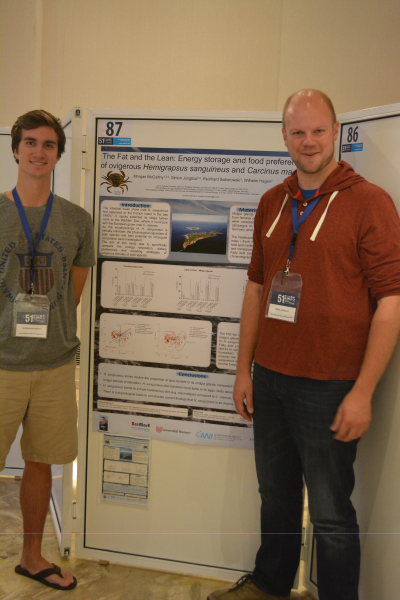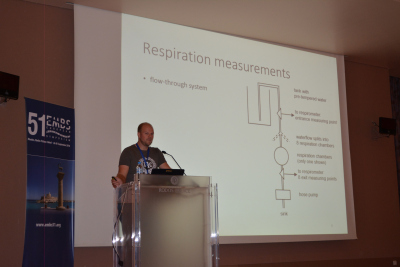Die Inhalte dieser Seite sind leider nicht auf Deutsch verfügbar.
Seitenpfad:
Simon Jungblut
Report of GLOMAR PhD student Simon Jungblut about his participation in the 51st European Marine Biology Symposium in Rhodes, Greece from 26 - 30 September 2016
GLOMAR funding allowed me to participate in the 51st edition of the European Marine Biology Symposium (EMBS) on the Island of Rhodes in Greece from 26 to 30 September 2016. Like last year on Helgoland, the conference was well organized and about 200 people met in a familiar and relaxed atmosphere.
I presented three projects of which one was an oral an two were poster presentations. My talk "Energetic demand of the invasive crab Hemigrapsus sanguineus and the native Carcinus maenas at Helgoland, North Sea" was well noticed what was proven by interesting discussions directly after the talk and in the following coffee breaks. The most remarkable discussion was with Dr Gonzalo Macho from Vigo University, Spain. We discussed further applications and project ideas of the flow-through respiration measuring device which I designed and presented in the talk.
The second presentation related to my PhD project, the poster "The fat and the lean: Energy storage and food preferences of egg-carrying females of Hemigrapsus sanguineus and Carcinus maenas" was jointly presented by my student Morgan McCarthy and myself. Morgan was the main person standing in front of the poster during the poster sessions. However, together we discussed future developments of the European Hemigrapsus populations and other implications of the results with interested colleagues when he caught me from the other poster or during the coffee breaks. While some people were specifically interested in the methods of lipid and fatty acid analysis, some others especially from the Baltic region were interested in our opinion whether or not Hemigrapsus will colonize the Baltic in the future. Colleagues from Poland and Estonia specifically asked us to send preserved material of Hemigrapsus sanguineus and the congener H. takanoi to have reference material at place in case the invading crabs will be found in their waters in the future.
During conversations, I referred to the third contribution, the poster "Biogeography of top predators along latitudinal transects in the temperate and tropical Atlantic Ocean", as my 'spare time research'. Most people were wondering that this contribution was on a totally different topic than the other two. However, all appreciated that, while naturally concentrating on my PhD topic, I am open to other fields in Marine Zoology and Ecology as well. Despite the scientific conversations on the topic of the poster, it also stimulated discussions on my personal future and provided evidence that I am open to other fields of research in upcoming projects.
Overall, the participation in the 51st edition of the EMBS was a full success in terms of scientific discussion and networking, partially even regarding future projects. I can fully recommend this annual meeting to any marine biology master student or PhD candidate.
I presented three projects of which one was an oral an two were poster presentations. My talk "Energetic demand of the invasive crab Hemigrapsus sanguineus and the native Carcinus maenas at Helgoland, North Sea" was well noticed what was proven by interesting discussions directly after the talk and in the following coffee breaks. The most remarkable discussion was with Dr Gonzalo Macho from Vigo University, Spain. We discussed further applications and project ideas of the flow-through respiration measuring device which I designed and presented in the talk.
The second presentation related to my PhD project, the poster "The fat and the lean: Energy storage and food preferences of egg-carrying females of Hemigrapsus sanguineus and Carcinus maenas" was jointly presented by my student Morgan McCarthy and myself. Morgan was the main person standing in front of the poster during the poster sessions. However, together we discussed future developments of the European Hemigrapsus populations and other implications of the results with interested colleagues when he caught me from the other poster or during the coffee breaks. While some people were specifically interested in the methods of lipid and fatty acid analysis, some others especially from the Baltic region were interested in our opinion whether or not Hemigrapsus will colonize the Baltic in the future. Colleagues from Poland and Estonia specifically asked us to send preserved material of Hemigrapsus sanguineus and the congener H. takanoi to have reference material at place in case the invading crabs will be found in their waters in the future.
During conversations, I referred to the third contribution, the poster "Biogeography of top predators along latitudinal transects in the temperate and tropical Atlantic Ocean", as my 'spare time research'. Most people were wondering that this contribution was on a totally different topic than the other two. However, all appreciated that, while naturally concentrating on my PhD topic, I am open to other fields in Marine Zoology and Ecology as well. Despite the scientific conversations on the topic of the poster, it also stimulated discussions on my personal future and provided evidence that I am open to other fields of research in upcoming projects.
Overall, the participation in the 51st edition of the EMBS was a full success in terms of scientific discussion and networking, partially even regarding future projects. I can fully recommend this annual meeting to any marine biology master student or PhD candidate.





